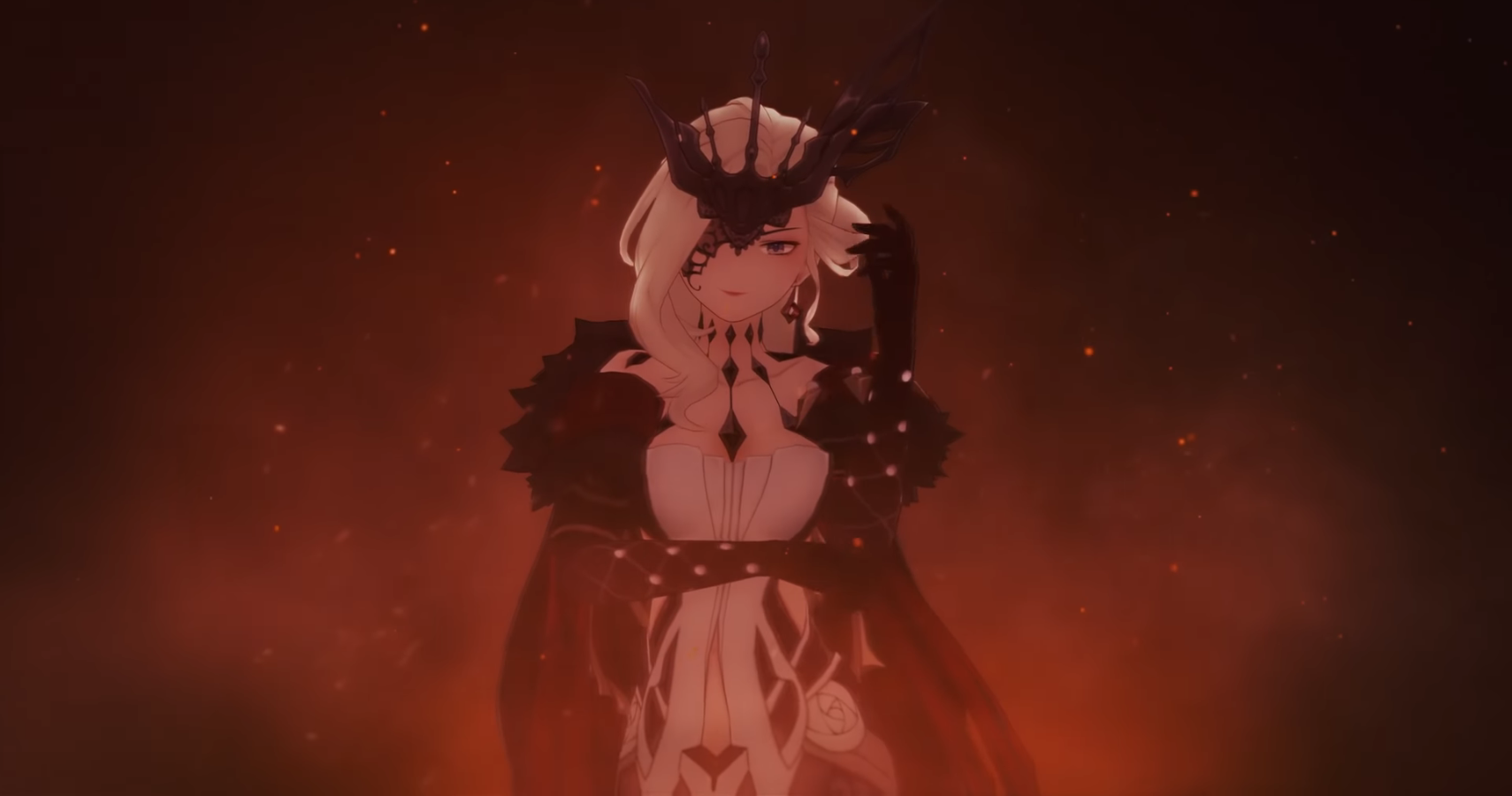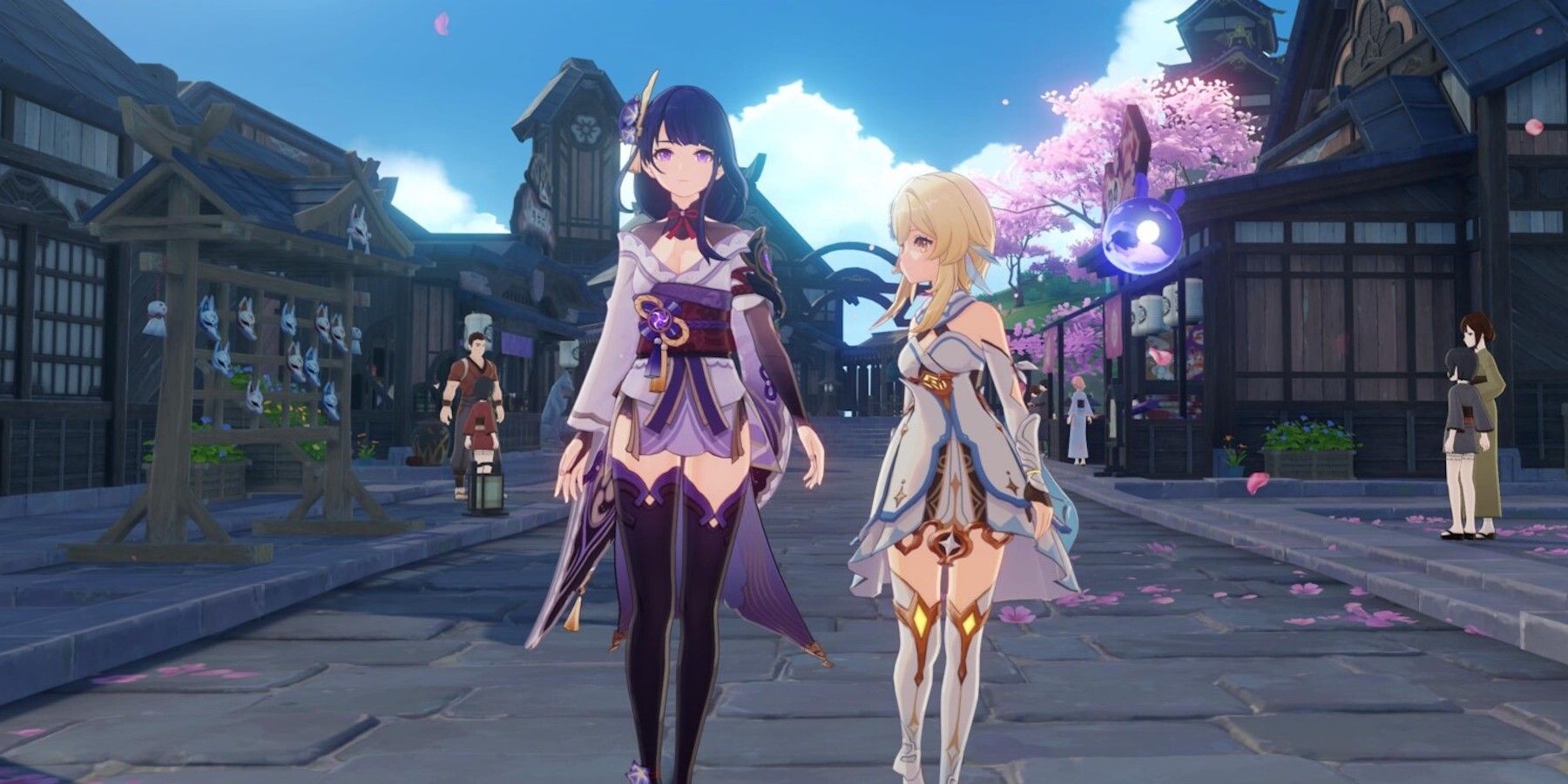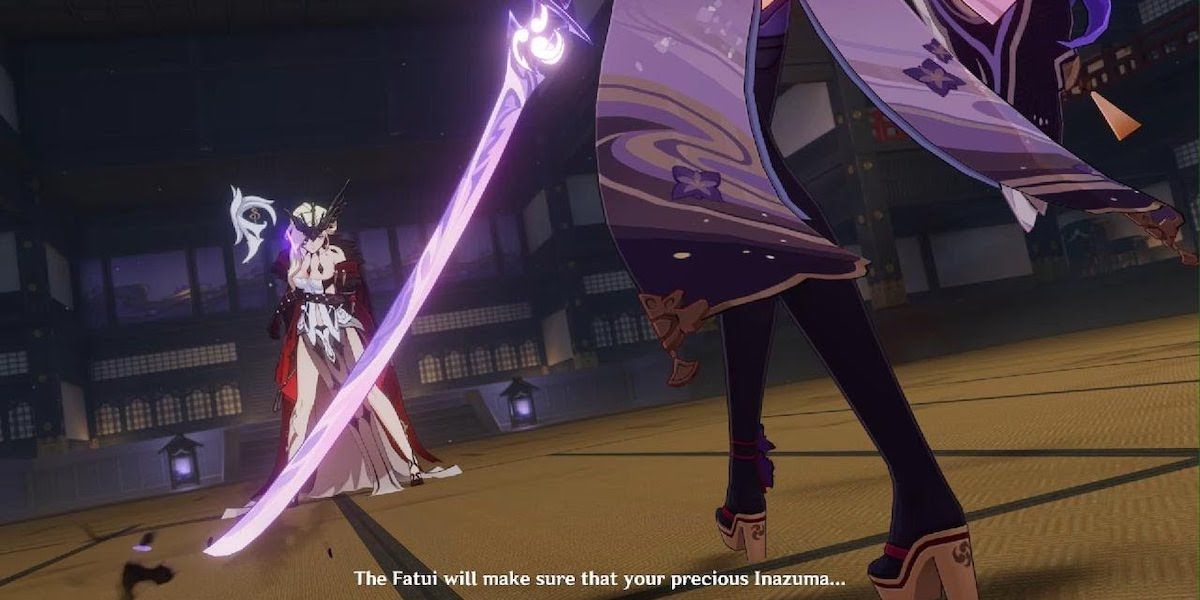One year into the game, Genshin Impact has taken players on a winding, whimsical journey picking flowers, exploring picturesque environments, and making friends. Though battles are constantly fought, the light-hearted nature of Genshin Impact kept the stakes low — until Inazuma. The Electro nation’s introduction in Version 2.0 marked a minute shift in tone that only escalated in tenor as additional pieces of the plot were unveiled. With Tsurumi Island's release and Inazuma's conclusion, it’s time to examine how Genshin Impact changed by the end of its first year and what these darker nuances in writing portend for the future of fan-favorite characters.
Note: This article contains spoilers for Genshin Impact Version 2.0 and onwards.
Genshin Impact is an open-world RPG but still a gacha game at heart — characters are the driving force of the game’s longevity. Players were therefore shocked by its first on-screen death: La Signora. The decision to kill off a figure whom many assumed would one day become a playable character pivoted audience expectations of what developer miHoYo would and would not risk with its golden goose.
RELATED: Genshin Impact: How To Go To Tsurumi Island
Signora's Secret History

Genshin Impact’s tendency to bury important information in the disparate clues of artifact descriptions has frustrated fans interested in keeping up with the expansive lore. La Signora is the Eigth of the Eleven Fatui Harbingers, who stole Venti’s gnosis — the Traveler never learns much else about her.
Instead, Signora’s tragic story is quietly hidden in the Crimson Witch of Flames: She was a scholar who suffered the loss of her lover during Khaenri’ah’s destruction. Signora’s grief transformed her into “The Crimson Witch of Flames,” whose “fires only touched monsters and demons.” Signora’s anguished crusade almost destroyed her body, until the Fatui gifted her a Cryo Delusion — a device that may tamper with the user’s memories.
None of Signora’s backstory is made apparent to the protagonist, and it isn’t easy for players to discover more without direction. However, Signora’s past provides some humanizing context for her allegiance: the Fatui saved her life while simultaneously burdening her with an object that may have altered her sense of self over time. This knowledge of Signora’s origins — her mission of “burning monsters into cinders” — contradicts her current portrait as someone who doesn’t value human life. At the very least, it paints her character a morally gray shade, at odds with the blanket darkness Genshin Impact has so far pushed onto the Fatui.
Why Signora Had No Redemption Arc

There are two individuals who share Signora’s morally gray characterization: Raiden Shogun & Tartaglia (Childe). Signora is portrayed as proud and sometimes cruel, whereas Raiden Shogun is less emotive, unempathetic as the casual cruelties of her Vision Hunt Decree are uncovered. The conclusion of Inazuma’s war-torn storyline fell remarkably flat.
Inazuma’s isolationism and internal strife, perpetuated by their own deity, fostered a sense of danger evident in the gameplay design (enemies were tougher and the landscape unforgiving). However, the writing de-escalated the conflict too quickly. The reason became obvious as the truth behind “Raiden Shogun” untangled.
Genshin Impact fans were hyped for Raiden: a character with complicated motivations and dubious social-ethical responsibility, much like Childe. However, while Childe endeavored to sink an entire city and still endeared himself to the audience, Raiden was absovled as a puppet “ruling” Inazuma on autopilot. The “real” Raiden Shogun was largely ignorant and misled by villainous catch-all, the Fatui.
RELATED: Animated Genshin Impact Chart Shows Which Banner Brought In the Most Revenue
The Raiden Shogun Story Quest was awkward, taking her shopping and introducing her to flavored milk. Somehow she created a cloned sentience to run Inazuma in her stead, but doesn’t understand the concept of a photograph. Raiden Shogun’s banner sales were immense: It wasn’t necessary to infantilize her character and absolve her of wrongdoing to ensure popularity from paying customers.
This should convey to miHoYo that morally gray characters — in this instance, especially females — are appreciated. The sharp contrast between Signora and Raiden Shogun is bleak: Signora may continue to live on-screen as a weekly boss, but she isn’t redeemable because she isn’t a character for sale.
The Traveler's Dark Side

The Traveler made a deliberate choice to kill Signora. The result of Musou no Hitotachi was clear: Raiden Shogun would execute the loser. By now, players can infer the Traveler is akin to some sort of deity: They possess elemental powers independent of Visions, are prone to apocalyptic flashbacks, and teleport all over the continent. Challenging Signora to a duel they knew she would lose is the first “god-like” move the Traveler has made, and players who are supposed to embody a first-person perspective in the Traveler are forced to conclude Signora deserves to die as well.
Genshin Impact startled fans in “We Will be Reunited” with a visibly dead Treasure Hoarder. Though frequently fought in-game, Treasure Hoarders escape in a puff of smoke upon defeat, unlike the humanoid Hilichurls. The Traveler expressed discomfort towards only the Treasure Hoarder, and after indirectly slaying Signora, players must button-mash their way through a panic attack. This is the heaviest indication of the Traveler’s personal psyche fans have ever seen, and an event that shifts perspective from the Traveler as a character overwhelmed by their decision.
The panic attack does make Signora’s death seem better calculated. La Signora's death was a significant narrative focal point, less about her as a character, and more about forcing development on the Traveler. The fact that Signora was popular in fan spaces doesn’t matter beyond her design, now immortalized in a weekly fight along with Childe — who also has his own speculation regarding his potential death. Developer miHoYo’s Honkai Impact has ruthlessly killed off popular characters before, and it’s unclear how far they’re willing to go with the less niche Genshin Impact.
Unlike Raiden Shogun, Childe’s Story Quest humanizes him, but it doesn’t excuse him — and that’s perfectly alright. So many of Genshin Impact’s characters are one-dimensionally good-hearted, and fans were eager to see how Inazuma’s civil issues would tackle more difficult topics. When the story instead reverted to a black-and-white interpretation with the Fatui’s stronghold over any problematic content, players were mostly disappointed. Genshin Impact fans are now left wondering what exactly the qualifications are for a character’s survival, and if miHoYo will design a morally gray, playable female character in the future.
Genshin Impact is available on mobile devices, PC, PS4, and PS5.
MORE: Genshin Impact’s Next Big Controversy Involves Elon Musk

